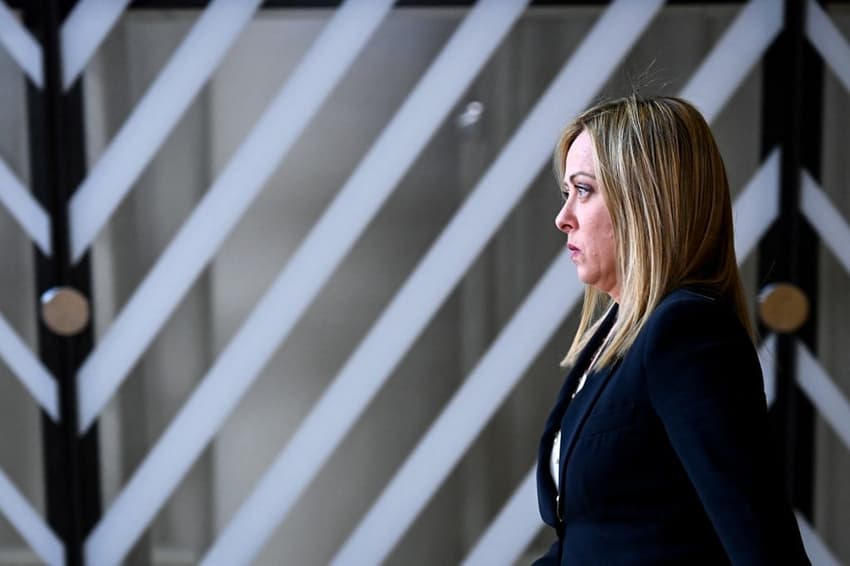'Presidenzialismo': Meloni begins talks on changing Italy's constitution

Italian Prime Minister Giorgia Meloni on Tuesday began meetings with opposition parties in an attempt to drum up support for her plans to change Italy's system of government and hand more power to the president or prime minister.
Meloni said ahead of the meetings on Tuesday that she hoped for “widely shared” support for her plans, but suggested that she could press ahead regardless.
"I think it is important to make such a reform with the largest consensus possible. This does not mean we will not do it if there is not a consensus," she said.
READ ALSO: Can Italy's Meloni really bring in a new presidential system?
Meloni has said she is open to discussions, but has been a strong proponent of so-called presidenzialismo, a presidential system with the direct election of a powerful head of state.
The introduction of such a system was a cornerstone of her right-wing coalition's election manifesto, alongside issues including immigration and the country's declining birth rate.
But her coalition didn’t win a large enough majority in parliament to be able to force through such reforms without broad support from other political parties.
On Tuesday, the two largest left-leaning opposition parties, as well as smaller centrist parties, all voiced opposition to the plans following meetings with the premier on Tuesday.
 Italy's Prime Minister Giorgia Meloni. Photo by: John THYS / AFP
Italy's Prime Minister Giorgia Meloni. Photo by: John THYS / AFP
Opposition Democratic Party leader Elly Schlein said her party was against the direct election of the president or the premier, news agency Ansa reported.
"We are not in favour of reducing the role of the president towards a model of a single man or woman in command," she said.
Earlier, Schlein had stressed that reform talks should not be used to distract from priority issues like the cost of living crisis, unemployment, the post-Covid National Recovery and Resilience Plan, and the state of the national health service.
READ ALSO: How could Italy's new government change the constitution?
Giuseppe Conte, a former prime minister and now the leader of Italy’s second-biggest opposition party, the Five Star Movement, told reporters following his meeting with Meloni that he was against all three of her proposed reform options: the direct election of the president as head of state by the people; French style ‘semi-presidentialism’ where the president is the head of government but picks a prime minister to carry out their programme; and the direct election of the prime minister by the people.
“At least from this first meeting there was no agreement,” he said.
Without support from other parties, the Italian government could only pass reforms to the constitution by holding a public referendum - a move which many in Meloni’s party reportedly believe would be too risky.
The reform plans have garnered little public interest so far, and presidential reform was not mentioned among the key topics for voters polled ahead of Italy’s September elections.
Meloni and other proponents of the idea of a new semi-presidential system say it would make Italian politics more stable.
READ ALSO: Why do Italy’s governments collapse so often?
The country has had almost 70 governments since the second world war, more than twice the number in the UK in the same period - but past attempts to produce a more stable system have failed amid disagreements over the best alternative.
The existing political system in Italy was designed under the postwar constitution, following the demise of dictator Benito Mussolini, with the aim of preventing any one party or political leader from seizing too much power again in future.
Comments
See Also
Meloni said ahead of the meetings on Tuesday that she hoped for “widely shared” support for her plans, but suggested that she could press ahead regardless.
"I think it is important to make such a reform with the largest consensus possible. This does not mean we will not do it if there is not a consensus," she said.
READ ALSO: Can Italy's Meloni really bring in a new presidential system?
Meloni has said she is open to discussions, but has been a strong proponent of so-called presidenzialismo, a presidential system with the direct election of a powerful head of state.
The introduction of such a system was a cornerstone of her right-wing coalition's election manifesto, alongside issues including immigration and the country's declining birth rate.
But her coalition didn’t win a large enough majority in parliament to be able to force through such reforms without broad support from other political parties.
On Tuesday, the two largest left-leaning opposition parties, as well as smaller centrist parties, all voiced opposition to the plans following meetings with the premier on Tuesday.

Opposition Democratic Party leader Elly Schlein said her party was against the direct election of the president or the premier, news agency Ansa reported.
"We are not in favour of reducing the role of the president towards a model of a single man or woman in command," she said.
Earlier, Schlein had stressed that reform talks should not be used to distract from priority issues like the cost of living crisis, unemployment, the post-Covid National Recovery and Resilience Plan, and the state of the national health service.
READ ALSO: How could Italy's new government change the constitution?
Giuseppe Conte, a former prime minister and now the leader of Italy’s second-biggest opposition party, the Five Star Movement, told reporters following his meeting with Meloni that he was against all three of her proposed reform options: the direct election of the president as head of state by the people; French style ‘semi-presidentialism’ where the president is the head of government but picks a prime minister to carry out their programme; and the direct election of the prime minister by the people.
“At least from this first meeting there was no agreement,” he said.
Without support from other parties, the Italian government could only pass reforms to the constitution by holding a public referendum - a move which many in Meloni’s party reportedly believe would be too risky.
The reform plans have garnered little public interest so far, and presidential reform was not mentioned among the key topics for voters polled ahead of Italy’s September elections.
Meloni and other proponents of the idea of a new semi-presidential system say it would make Italian politics more stable.
READ ALSO: Why do Italy’s governments collapse so often?
The country has had almost 70 governments since the second world war, more than twice the number in the UK in the same period - but past attempts to produce a more stable system have failed amid disagreements over the best alternative.
The existing political system in Italy was designed under the postwar constitution, following the demise of dictator Benito Mussolini, with the aim of preventing any one party or political leader from seizing too much power again in future.
Join the conversation in our comments section below. Share your own views and experience and if you have a question or suggestion for our journalists then email us at [email protected].
Please keep comments civil, constructive and on topic – and make sure to read our terms of use before getting involved.
Please log in here to leave a comment.